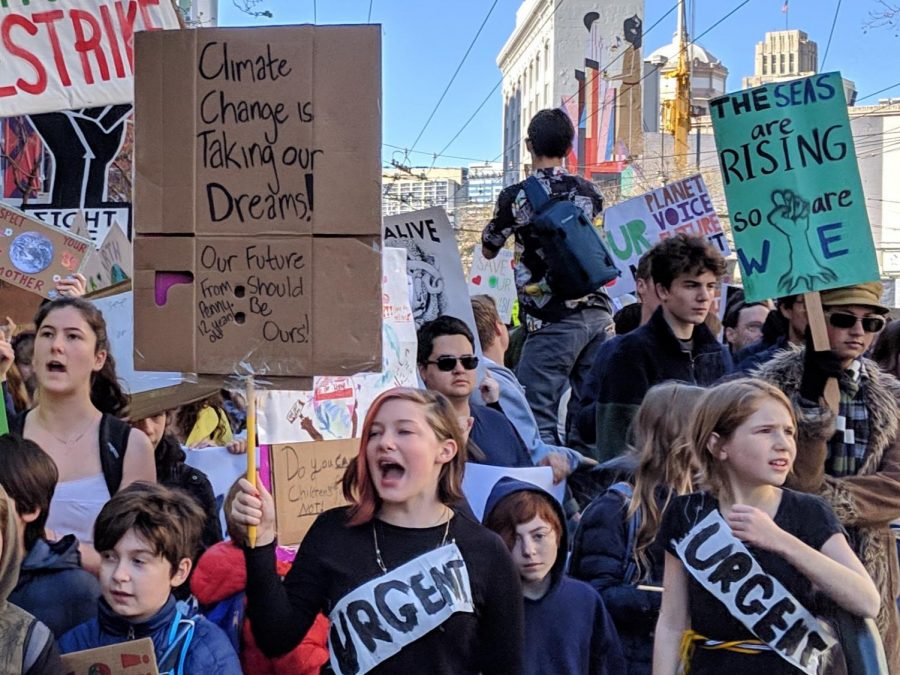Climate strikes burn through the globe
In 2018, leading climate scientists prepared a report for the United Nations on their findings on climate change. The report was dire. According to the UN Intergovernmental Panel on Climate Change (IPCC), “urgent and unprecedented” changes would be needed in order to keep the Earth’s temperature rise below 1.5 degrees Celsius. Even a half degree warmer could result in disastrous droughts, floods and extreme heat. And the amount of time the people of Earth have left to make these unprecedented changes?
A mere 12 years.
A year after this landmark report, 150 countries across the globe held climate strikes as a part of the Global Week for Future. The strikes that occurred on Sept. 20 are cited as being the largest climate strikes in world history. Greensboro was one of approximately 4,500 cities that participated in striking.
Senior Madison Shankin attended Greensboro’s climate strike at Center City Park because she felt it was important to support a movement she believes to be vital to her future.
“I think global movements are an extremely effective way to bring attention to any issue,” Shankin said. “Something like that will definitely make it into a mainstream news outlet.”
Even in the wake of these massive protests, a question reverberated amongst those who participated and those who did not; how much can a strike, even a global strike, accomplish in the face of looming cataclysmic disaster?
According to junior Echo McLachlan, who also went to Greensboro’s climate strike, the event highlighted problems the nation has with addressing climate change.
“People went to the climate strike out of a desire to show they cared about the environment, but then there was a sense of, ‘well, what are we doing now?’” McLachlan said. “It’s stupid to sit idly by when we’ve been hearing about the impact of climate change and carbon emissions for our whole lives. This isn’t anything new. To ignore it is to play into your own downfall.”
Junior and environmental studies major Ian Gordon believes the global climate strike plays a small role in an ultimately radical process that will be needed to confront global warming.
“I think (the climate strikes) are really cool and a great example of people coming together,” Gordon said. “But if we really want to end climate change and take action, that involves overthrowing capitalism.”
Capitalistic society has largely been pointed to as a contributor to global warming. Capitalism promotes profit margin over sustainability, and according to the ICC’s report, the “era of cheap energy is coming to an end.” The report continues to explain that “no widely applicable economic models have been developed specifically for the upcoming era.”
“The reason that we have such large fossil fuel emissions, greenhouse gas emissions and pollution is because companies are trying to make money but not considering the impact on the Earth or the people on this Earth,” Gordon said. “They’re just doing whatever is cheapest.”
McLachlan also finds capitalism to be a predominant threat to the environment and believes that capitalist responses to climate change are ultimately ineffective.
“People aren’t taking (climate change) seriously enough, and we should be unifying and looking at things on an international scale,” McLachlan said. “There’s a very capitalist aspect of, ‘oh, we should be buying reusable things and recycling.’ Those things are important, but not everyone has accessibility to that.”
The Global Week for Future has been notably youth-led. The movement was in part sparked by 16-year-old Swedish climate activist Greta Thunberg’s “school strike for the climate” protests.
“I think Greta Thurnberg is really cool, but also there are a lot of people, especially young people of color, who have been doing this work, and should be getting credit for doing this work,” Gordon said.
McLachlan believes that the world’s youth must play a vital role in confronting climate change.
“I think older people think that their part is kind of done because their time is running out, and that it doesn’t matter because it won’t affect them,” McLachlan said. “Young people need to be involved because it’s very easy to ignore what is going on and focus on yourself and what is immediately applicable to you. You may not be experiencing climate change first hand yet, but it’s a matter of time.”
Editor’s note: This story originally was published in Volume 106, Issue 1 of The Guilfordian on Oct. 4, 2019.






